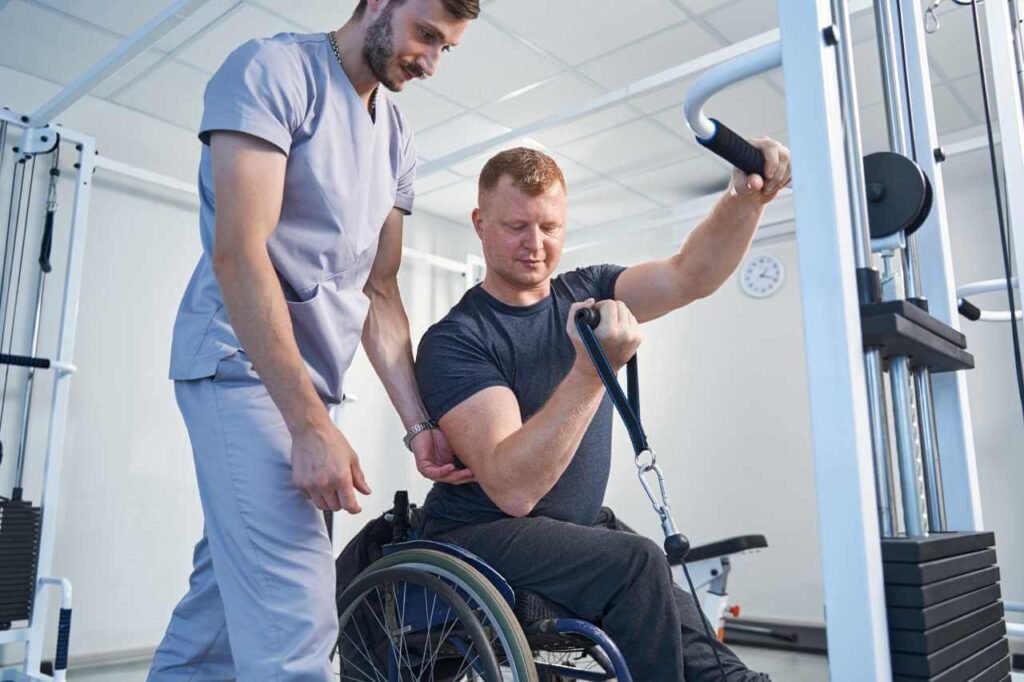Key takeaways
- Support coordinators help you understand and implement your NDIS plan, making the whole process easier.
- They connect you to quality disability services in Australia, monitor your progress, and adjust plans as needed.
- They advocate for your rights and help you gain confidence to manage your NDIS journey independently.
Navigating the NDIS system can often feel confusing. If you’ve ever been overwhelmed by the jargon and processes, you’re not alone.
It’s a lot to take in — and that’s where a support coordinator comes in.
When you reach out to an NDIS support coordinator, you get the help you need to make sense of the NDIS and get the most out of your plan.
They work with you to identify your needs, connect you with services, and make sure everything runs smoothly.
Understanding the key responsibilities of a support coordinator is important. In this blog, we’ll break down what exactly a support coordinator in the NDIS does and how they can make your support experience better.
Understanding NDIS Support Coordination
Support coordination is a service designed to help NDIS participants make the most out of their NDIS plans.
It’s essentially having an NDIS expert by your side — someone to answer all your questions and help you through the often complex NDIS process.
But why is support coordination important?
A support coordinator steps in to streamline processes, connect you with the right services, and guarantee that your needs are met effectively.
They make the journey smoother and less stressful.
Generally, you’ll find three main types of services:
- Support connection helps you understand and implement your NDIS plan so you can connect with NDIS-accredited providers.
- Support coordination focuses on building your ability to connect with support services and manage your plan independently.
- Specialist support coordination is provided for those with more complex needs, requiring a higher level of coordination.
5 responsibilities of an NDIS support coordinator
Responsibility #1 – assessing and understanding individual needs
The first step a support coordinator takes is getting to know you. It starts with any other first meeting – with a good introduction.
Initial meetings set the foundation for everything that follows.
During these sessions, the coordinator spends time understanding your unique situation, goals, and challenges.
Your disability support worker will ask questions about your daily routine, the support you currently have, and what you hope to achieve with your NDIS plan.
It’s a friendly interview where your needs and preferences are the priority. This helps them paint a detailed picture of your needs.
Personalised planning
Once the coordinator has a good understanding of your situation, it’s time for the real work – creating a personalised plan.
The support coordinator works closely with you and your family to develop a plan that aligns with your previously discussed goals and needs.They take into account everything they’ve learned during the initial meetings and assessments.
Through collaboration, you get a plan that’s realistic, achievable, and truly reflective of your aspirations. It’s a team effort, where your input is valued and central to the planning process.
This personalised approach sets the stage for effective and meaningful support, making sure you get the most out of your NDIS plan.

Responsibility #2 – connecting participants to services
Once a personalised plan is in place, their next responsibility is connecting you to the right services.
Your NDIS support coordinator works like a matchmaker. Their goal is to match you with the perfect services to meet your needs.
Coordinators have a vast network of reliable service providers at their fingertips.
This network includes everything from healthcare professionals and therapists to social and community support services.
The importance of having a broad network can’t be taken for granted. It guarantees that whatever your needs, there’s a suitable service out there.
Your coordinator’s connections help you access the best support available, specifically designed to help you.
Ensuring quality and suitability
While having access to a big list of providers is great, this isn’t the end goal of a support coordinator.
Quality and suitability are the priority. Coordinators meticulously evaluate service providers to make sure they meet high standards.
They look at factors like qualifications, experience, and feedback from other participants. This vetting process makes sure that you’re not just getting any service, but one that’s proven to be effective and reliable.
Coordinators often start with a trial period to confirm the services are a good fit. They closely monitor how well the services meet your needs and make adjustments as necessary.
Responsibility #3 – monitoring and reviewing progress
Regular check-ins are like the pulse checks of your NDIS journey. These meetings are important because they help keep everything on track.
During these sessions, the support coordinator sits down with you to discuss how things are going.
Are the services meeting your needs? Are there any new challenges? It’s a chance to voice any concerns and celebrate the wins.
These regular meetings aren’t just a formality. They’re how you can make timely adjustments.
Also, life is dynamic — and so are your needs.
By keeping in touch, coordinators can tweak your plan as needed, making sure it remains relevant and effective.
Documenting and reporting
Behind the scenes, your support coordinator keeps a meticulous record of your status and progress within the NDIS program. Keeping detailed records is important for several reasons.
First, it provides a clear history of what’s been tried, what’s worked, and what hasn’t. This is valuable for making informed decisions about future support.
These records are also used to provide feedback to service providers, verifying they stay accountable and effective.
If something isn’t working as expected, the coordinator can use these insights to make adjustments.
This ongoing documentation helps in creating a transparent and effective support system tailored to your changing needs.
Responsibility #4 – advocating for participants
Support coordinators are your voice when navigating the NDIS.
Coordinators step in to address any issues that might arise, from service delivery problems to accessing the right support.
For example, if you’re not receiving the quality of service you deserve, your coordinator will step in to address the issue with the provider.
They are there to make sure you’re treated fairly and respectfully.
Managing the NDIS system
The NDIS system is known to be complicated and filled with a lot of paperwork and legal requirements.
Coordinators help you go through these processes. They assist with filling out forms, understanding your plan, and managing the administrative aspects of your NDIS experience.
Their help makes sure that you don’t miss out on any entitlements or support opportunities.
Support coordinators help simplify the system, making it more accessible. This support is especially critical during reviews and assessments, where having an advocate can make a significant difference in the outcome.
Responsibility #5 – building participant confidence
An important part of a support coordinator’s role is education.
They help participants understand their rights and the options available under the NDIS. Not only do they provide useful information, but they also empower you with the knowledge to make informed decisions.
Coordinators provide guidance on how to manage your supports, navigate the system, and utilise your plan effectively. This way, you can eventually handle your NDIS plan independently.
Long-term independence
The ultimate goal of support coordination is to foster long-term independence. This journey towards self-reliance is gradual and customised to your unique needs.
The end goal is to become a participant who, with the help of their coordinator, learns to coordinate their services, advocate for themselves, and adjust their plan as needed.
Over time, they become less reliant on the coordinator and more confident in their ability to manage their NDIS journey.

What makes a good NDIS support coordinator?
A good NDIS support coordinator should be more than just knowledgeable. They need to have qualities that can make a real difference.
Empathy is fundamental. You should work with someone who understands and shares the feelings of participants.
Being organised is another key trait, as coordinators juggle multiple tasks and make sure everything runs smoothly.
Advocacy skills are also important. A good coordinator stands up for their participants, guaranteeing their needs and rights are always prioritised.
Training and certification
While a support coordinator doesn’t need to be registered with the NDIS, it’s certainly beneficial.
Registration often means they have met specific standards and are committed to ongoing professional development.
It signifies government approval, making sure they meet competency and qualification standards.
Registered support coordinators adhere to the NDIS Code of Conduct which creates greater trust among participants.
Continuous training is important in this field, as the NDIS framework can change and new best practices emerge.
A coordinator dedicated to learning ensures they are always providing the best possible support, and staying current with the latest developments and techniques.
Being registered means that a support coordinator can be listed in the NDIS Provider Finder tool. That way participants can easily find and enquire about their services. You can also have access to faster payments with a registered support coordinator.
NDIS support coordinators can make a real difference
Support coordinators play a major role in the NDIS framework.
Their responsibilities make sure that participants are not only supported but also empowered to achieve their goals and lead fulfilling lives.
A good support coordinator can make a world of difference, turning complex NDIS processes into manageable and effective plans tailored to each participant’s unique situation.
Their dedication and expertise help participants navigate challenges and celebrate successes.
Consider the positive impact a trusted support coordinator can have on your NDIS journey. They are there to guide, support, and empower, making the path easy and more fulfilling.

